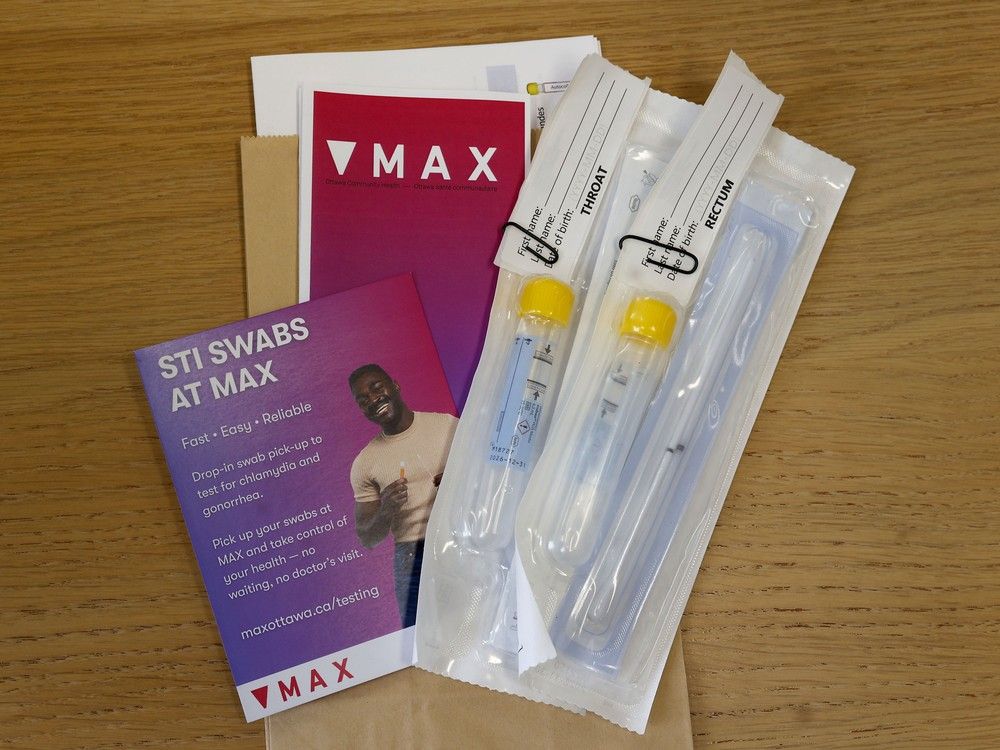As rates of sexually transmitted infections (STIs) rise in Ottawa, one community health clinic is trying to break down barriers to testing and health care by launching a free service that will allow residents to pick up swabs and drop them off at a lab of their choice.
MAX Ottawa Community Health
, in partnership with
Ottawa Public Health
and Getakit, developed a new service — the first of its kind in Ontario — to streamline STI testing across the city.
Until now, Ottawa residents were able to get swabs and kits mailed to them via Getakit. However, this could cause delays in getting tested and cause issues for people who are housing insecure or don’t live alone.
Adam Awad, MAX’s executive director, said he heard a specific scenario in which a young man was scared to get tested because he lived with his parents. The man shares his location with his parents all the time and his parents would question him if they found out he went to a sexual health clinic.
“We’ve been working together (with Getakit) for several years, and we realized that there are still barriers, even for people who are using the online system,” said Adam Awad, MAX’s executive director.
“STI swabs are not available in labs in Ontario, so you have to get them from somewhere, and at the moment Getakit mails them out to people. But that means you have to have a mailing address, and it means that you need to have things mailed to you. So if you are in the closet, if you are living precariously, then you’re not as likely to get tested.”
Now, Ottawans can pick up oral and rectal swabs and testing kits from the MAX Ottawa Community Health office at 400 Cooper St. after taking an online assessment. They can then drop off the swabs at any lab of their choice, and a text message will be sent when results are ready. If a test comes back positive, a link will be included to book an appointment for treatment.
MAX is the first swab pickup site in Ontario, and the team hopes to expand the service to other areas of Ottawa and surrounding regions once it is more established.

The hope, Awad said, is to prevent STIs among priority populations as much as possible. This includes men who have sex with men and trans women.
The team also hopes to break down stigma and shame surrounding STI testing.
According to a 2021 article in The Lancet, people with STIs are often met with disapproval, rejection and exclusion globally. This stigma causes a lot of people to avoid seeking testing, treatment and care because of experiences with discrimination, indifference and hostility in social and health-care settings.
“Conversations about some of those barriers led us to having a conversation
with Getakit
about what we might be able to offer as a community health organization that goes above and beyond specific clinical pathways that exist,” Awad said.
“The new service is about getting people the testing that they need in a way that works for them and reducing those barriers so that we can do something meaningful about the rising transmission of chlamydia, gonorrhea, syphilis, HIV, etc.”
STIs rising in Ottawa
Health experts have been reporting rising rates of STIs across Canada for years.
According to data from MAX, chlamydia cases in Ottawa increased by 36 per cent between 2021 and 2023. More than 3,400 new cases were reported in 2023 alone.
Gonorrhea cases in Ottawa also increased by 61 per cent in the same time period, MAX said. More than 960 new cases were reported in 2023.
However, Awad said a lot of chlamydia and gonorrhea cases among men who have sex with men and trans women are often missed because many of these cases are found outside of the genital area.
Most labs and clinics only do urine tests, he said.
“Unless we do something about it, it’s not going to change. And if left untreated, for a lot of people, these bacterial infections can actually cause long-term problems in a really substantial way,” Awad said.
HIV cases
have also risen across the country. According to the Public Health Agency of Canada, 2,434 new HIV diagnoses were reported in 2023. That is a more than 35 per cent increase since 2022.
The national rate of new HIV diagnoses in 2023 was 6.1 cases per 100,000 people.
“So it’s not just about sex. It’s about reproductive health. It’s about overall health. We know that if you have an untreated case of chlamydia or gonorrhea … in particular, if it’s a rectal case, the likelihood of HIV transmission skyrockets.
“If we want to eliminate HIV transmission and end the epidemic in Ottawa, then we also have to deal with these other things.”
Faster testing equals faster treatment
MAX’s new program also hopes to reduce wait times between testing and accessing treatment.
People who want a test often are able to grab a testing kit from MAX and then book an appointment for treatment at
Ottawa Public Health
in the same day. If results aren’t available the same day, wait times are usually one to two business days.
“There was one person who gave us feedback. He said from the time that he got his results to the time that he got his treatment, it was faster than he could have ordered a shawarma,” Awad said.
“That’s a pretty solid endorsement. … It’s very exciting that we’re able to develop this, that we are moving beyond this period of waiting a couple of weeks and not hearing anything back.”
The swabs and testing kits available at MAX are also free, eliminating financial barriers for many. However, Awad said it is important for people to take the online assessment first to determine what kind of tests they may need before coming in.
“The kit system is based on behaviour. … The assessment takes you through a whole set of criteria. The tests that you get at the end depend on what it is that you’re doing,” the executive director said.
“If somebody identifies themselves as a man and if they have sex with men, or if they’re a trans woman, then they will get prompted at the end to pick up swabs. If you’re not swabbing, then you don’t need to come into our office at all, you can just do the assessment online and go to the lab.”
Awad hopes the accessible swabs and kits will encourage more people to get tested regularly, especially since STIs often don’t have noticeable symptoms.
“The best way to know for any STI is to test, and so if you are dating people, if you are partying, maybe you were in a relationship and you’re getting back out into the dating scene. If you’re having any kind of sexual contact, you should be testing on a relatively regular basis,” he said.
“They provide you a peace of mind. It makes sure that if there is something that you can get treated right away and and you can prevent some of these other complications.”
Most importantly, he hopes the new program will allow people to take control of their own health.
“Services like this that reduce the barriers that people face in accessing appropriate health care are how we need to move forward with public health in the future. There will always be a place for clinical care, but increasingly, there’s also a place for people to take control of their own health,” Awad said.
“Swabbing is useful for a lot of people, but it’s not going to work for everybody. An online system is useful for a lot of people, but it’s not going to work for everybody. And so if we can streamline the process and make it easier for people to be in control of their own health, it has all sorts of other implications for our system and our capacity as a whole.
“This is a model for how we take health care into the future by decentralizing it, by developing tools that actually work for people and that allow multiple pathways to care, rather than having a single model that that everybody has to fit into.”
Related
- Kanata Knights football club honours slain teen through bursary
- City, transit workers’ union reach tentative contract agreement



